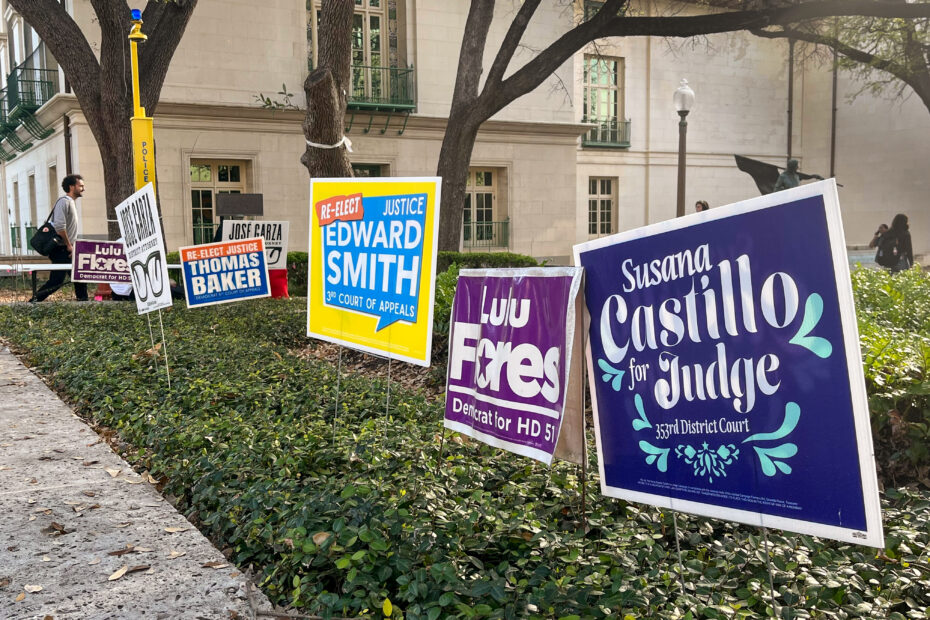The primaries kicked off this election year on March 5 and students across The University of Texas organized to vote or encouraged others to.
UT offered two voting locations for early voting and election day, one at Peter T. Flawn Academic Center on the west side of campus and one at Lyndon B. Johnson School of Public Affairs on the east side of campus. This access is rare as about 50% of Texas public universities have a singular location for early voting on campus. According to TX Votes, a non-partisan voting organization on campus, 76.6% of UT students voted in 2020, compared to an average of 66% among all Texas institutions.
TX Votes is one of a few different organizations dedicated to mobilizing student voters on campus. The group hosted bootcamps to train volunteers, helped register student voters and informed students on why and how to vote. They also offered resources and guides to ballots and signed students up for mail-in ballots. During the first week of early voting, the organization said UT’s polling sites had over 700 votes cast.
Sena Oğuzman, is a freshman rhetoric and writing major. She works with the group and attributes the group’s non-partisanship to their wide outreach.
“I was really interested in what non-profit organizations could do. I realized — to a voter — information, ballots and all aren’t really that accessible,” Oğuzman said.
On Election Day, the FAC was buzzing with foot traffic. Soon-to-be voters formed a long line outside the doors while journalists recorded video packages with wide smiles. Oğuzman and another student sat behind a desk with a banner that read “TX Votes.” They asked passers-by about their registration status and offered roses to the ones who voted.
Texas hosts open primaries, allowing voters to choose which party’s ballot to vote on, regardless of political affiliation. These elections are often overlooked compared to the Presidential election in November, but are just as important. Winning candidates will advance to the November election and many positions could run unopposed, due to a lack of competition.
The Secretary of State, Jane Nelson, said over 69,000 people participated in early voting while almost 75,000 people went to the ballot on election day. Like many other urban counties, these numbers were lacking in comparison to the 2020 and 2022 elections, which were particularly popular years to vote. The group attributed this change to students having more frequent political conversations in the past due to events like the pandemic, the Black Lives Matter protests and January 6 Insurrection.
Sarah Batson is TX Votes program coordinator and a first-year graduate student studying national public affairs at UT. She was interested in mobilizing voters and has been involved since she was an undergraduate freshman.
“Student organizations kind of make it more normalized and make it part of being a student at UT. So, for a lot of students, it’s not strange to vote,” Batson said.
Though organizations like TX Votes help to mobilize young voters across the country, Batson said most of the college-age demographic is less likely to vote due to lack of experience.
“Things like a new address, not having the right ID or not knowing where the polling places are can be unexpected challenges, because for most [older] people, they would be at the same polling place for 15 years,” said Batson.
Batson also recognized that the younger demographics are overlooked by campaigns and organizations. She said that many groups find it more effective to invest in elderly voters than gambling on young adults.
“If you change that through organizing, through increasing the norms as you go, your generation becomes the one that is more likely to text your friends and tell them to go vote,” said Batson. “It means that the policy preferences of candidates change, they have to care more about the policy problems of young people.”
This election year is far from over as the presidential election looms over the horizon. The deadline to register is October 7, early voting is October 21 to November 1 and election day is November 5.
If someone forgets to register to vote before the deadline, there are still ways to cast their ballot. They can request a limited ballot during early voting or a provisional ballot on election day.
